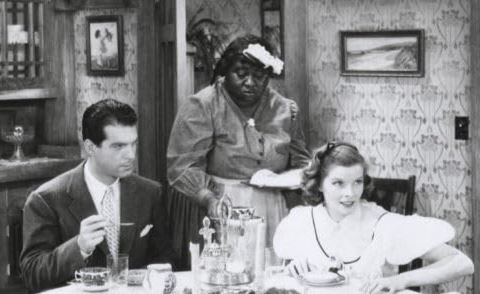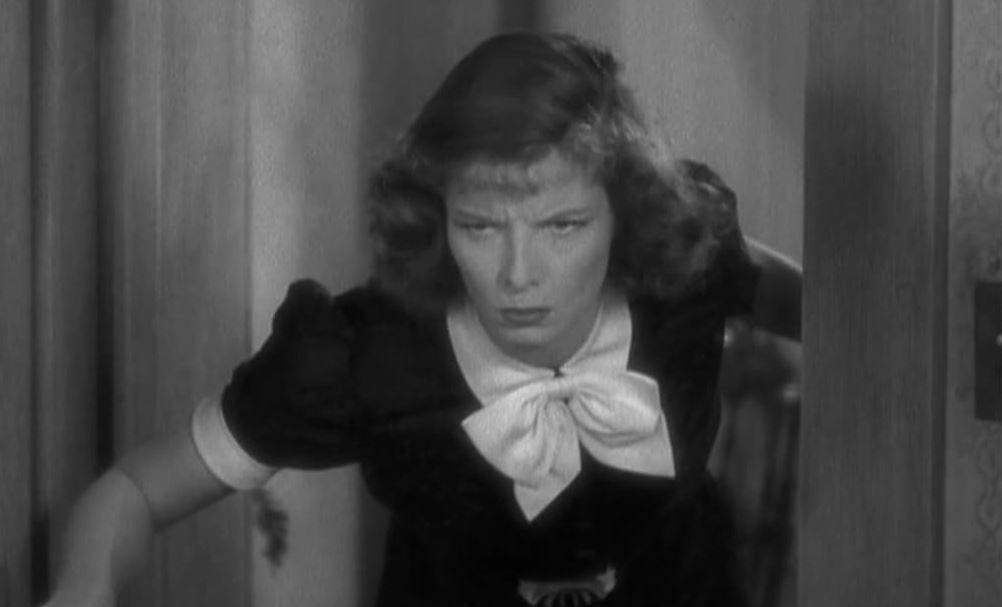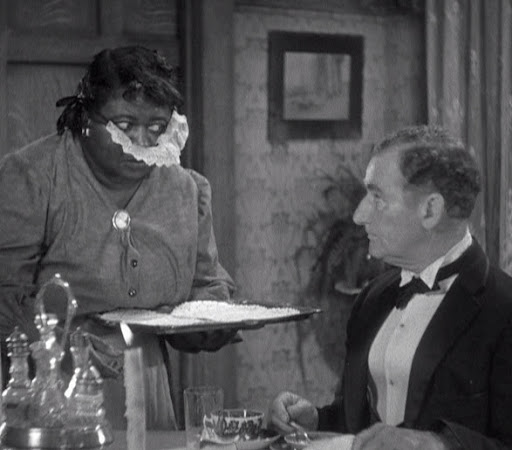
The year is 1935. A Depression has erased 1 in 4 American jobs. Foreclosures are a daily event. Banks have absconded with billions in depositor’s funds. Even stock traders are still leaping from windows. Poverty reigns. Sorrow is the default position. And in the daily life of Ms. Alice Adams (Katharine Hepburn), anything and everything afflicting the mind of man may as well be taking place on the moon. Europe on the brink of chaos? Too bad for them. Alice has a dance to attend. And a corsage to put together, even if she has to pick flowers roadside to do so.
You see, she needs a man. A rich man. A rich man who can listen to her endless babble with the raptness of a captive. Someone to shower her with gifts, compliments, and glassy-eyed devotion. Naturally, her entire family is similarly devoted. Whatever Alice wants, the bitch gets.
Though Alice leads the way with single-minded self-involvement, mom, dad, and brother alike are all equally guilty. The sentence, death, only Hollywood hadn’t the courage. They are, long story short, the worst family ever portrayed on screen. Mom, vile ball-buster, reducing dad to an emasculated milquetoast at every conceivable opportunity. Double the effort when he’s vulnerable and sick. Dad, a whiny simpleton, who steals an idea from his boss and tries to profit from it, only after surrendering his sack to every female within earshot.

And brother, well, he’s a degenerate gambler with sticky fingers and an even stickier sense of morality. Still, despite all their particular nastiness, they have huddled together, nodded affirmatively, and set about to ensure that Alice be placated from sunup to sundown. They feed her delusions. Cater to her whims. Tell her how interesting she is when she’s anything but. Agree that the only reason to make money in this life is to push an insufferable, pretentious twat into high society. Sadly, she gets everything she wants and then some.
Enter Malena. A black woman in 1935, she is, unavoidably, a domestic. A hired gun to keep whitey from having to do the grunt work. A woman of few words and even fewer signs of underlying humanity. The inevitable condescension that afflicts such roles is ever-present, but only because the filmmakers insisted there was no alternative. Only there was. Yes, Malena serves. Yes, she’s denied a backstory or future tense.
But here, four years before her Oscar-winning role in Gone With the Wind, Hattie McDaniel plants her flag. Makes her case. Rolls her eyes with such force, the house nearly falls down around her. She’s doing a job, but her way. Though only around for a few minutes, the sheer defiance of her body language damn near started the Civil Rights Movement twenty years ahead of schedule.
Call Malena’s one scene an undignified embarrassment if you wish, but you’d be missing the point. She is demeaned and lectured, yes, but she doesn’t listen to a goddamn word. She is treated like a child, but she alone emerges as the only adult in the room. This is a thankless job, perhaps her 500th over a long decade. Whatever it takes to keep the lights on. But she’s a witness. An observer of fact. By preparing dinner, serving, and clearing the table, she knows more than she’d ever let on. Crackers be crazy. Hung up on bullshit, their madness will be their downfall. Not one of them with a lick of sense. We know because for all the demands that are barked, no one seems to notice that not a single one is carried out. Not giving a fuck has rarely been so revolutionary.

While Alice is getting ready for the big dinner (her beau is coming to meet the parents), a violent crash is heard. As a mere aside, someone mentions that Malena may have fallen down the stairs. She is not seen or heard from in some time. That’s the level of concern expressed by the family (though dad stupidly cries, “Did she break any of our things?”) Malena could be in the basement with a broken neck, and they still expect the hors d’oeuvres to be delivered hot.
After a good five minutes, I cried out, “Where the fuck is Malena?” My outrage is tempered only by my disgust. Then I laughed. The laughter became a roar. Of course, she never cried out or made herself a victim. She knows she’s invisible to this miserable bunch of saps. If anything, she’s merely testing her theories. Confirming what she already knows. She’d likely poison the lot but leaving them alive means they’ll suffer that much more.
Whether or not it was ever intended, the lasting import of characters like Malena is that, amidst yet another tale of white folks wasting time, they are always more interesting than anything else going on. Thankfully, Malena isn’t saddled with the typical racist dialect of the day. In fact, she damn near remains silent. There are no bug eyes, buffoonish pratfalls, or hyperbolic mannerisms.
She moves quietly, pointedly, and with minimal distraction. She’s sick of this shit, which would be noticed by anyone who bothered to care. She’s delightful and lovely precisely because she alone among the cast knows the score. Far from romanticizing her subservience, it’s seeing her actions for what they really are, then and now: survival at all costs, and the knowledge that only those this bloody awful ever insist on their superiority.
Leave a Reply